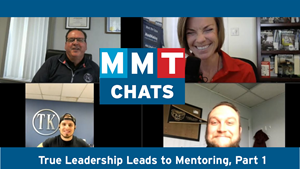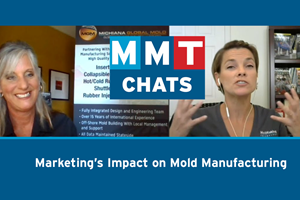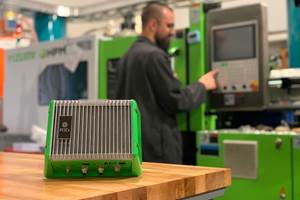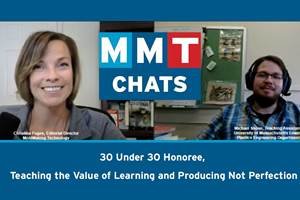Skills Center: Apprentice Training - Work Ethic and Attitude
Once a new employee is hired, it is the company’s responsibility to teach that new hire the requirements and expectations of the position, including how to work with good work ethic and a positive attitude.
This month, we address what may not be considered a traditional topic for training in mold manufacturing: work ethic and attitude. Most of the companies I encounter in my training sessions have all but given up on finding candidates who have some level of prior industry experience or training, and are ready and willing to hire inexperienced people who simply have good work ethic and a positive attitude. I consider this type of person one who shows up to work on time every day and performs the tasks he or she has been given without excuses, procrastination and pushback.
Unfortunately, many employers complain that candidates who meet even this basic requirement have become harder to find in recent years. This short article is not the place to try to determine whether this is true and, if it is, the reason it is. That would be a long discussion. However, I do hope to share some strategies that may help employers manage this problem.
I have trained hundreds of entry-level manufacturing workers over the years. And while it is true that many appeared to be less interested in hard work than I was when I first entered the trade, it is also true that very few were raised on a farm and taught how to work at a very young age, as I was. Is this their fault? No, it is not. Just as I cannot take credit for someone taking the time to teach me how to work, they cannot be blamed for someone failing to teach them how to work.
Let’s face it: Once a new employee is hired, it becomes the company’s responsibility to teach that new hire the requirements and expectations of the position. That not only means that the mold shop must be prepared to teach the employee how to build molds and run machines, but it must also be prepared to teach the new hire how to work with good work ethic and a positive attitude.
Teaching Soft Skills
To begin, business managers need to understand the landscape across which they conduct and manage business. By that, I mean they must recognize the stark contrast in job expectations that can exist between the older generation of workers and the current generation entering the trade. For example, many newcomers to the industry often come directly from an educational environment in which there are very few hard deadlines that if missed invoke any real consequences. They might have been able to get extensions on assignments and book reports in school with no problem, and do not understand why that same approach is a problem with customers in the industry. The culture in education has changed dramatically in the last few decades from what it was when most current shop managers were in school. These generational differences impact learning and success, so they must be addressed immediately after a new hire.
I recommend holding a class on the employee’s first day that clearly outlines the company’s expectations for work ethic and attitude. Ideally, elements of this would be explained in the job interview and then reinforced on the first day of orientation, but the teaching should not end there. Weekly discussions between the new employee and his/her manager should be scheduled for at least the first three months of employment to make the new employee aware of how well he or she is meeting expectations. Many companies say they often lose apprentices within the first three months of employment, and they learn during exit interviews that the reasons have to do with poor communication and misaligned expectations. The weekly meetings between new employee and manager should be held in a no-pressure, non-threatening environment that allows the new employee to voice his or her concerns in a respectful way. In turn, the employee should understand that his or her manager will be honest as well, in spite of how it might make the new hire feel, because it is important to his or her success.
The manager needs to constructively correct any of the employee’s deficiencies without being too harsh. One of a manager’s biggest challenges but most important strategies is to be open to receiving constructive criticism as well, as each new team member may have different needs that can only be explained by the new employee.
A key generational difference is that newcomers tend to have a “relational” focus on what they are looking for in their careers. This means they want to know that they have a connection with the people they are working with and are respected by their peers. These initial meetings provide an important opportunity for shop leaders to mentor their new employees, showing them that they care about their success. This creates a strong culture of teamwork and learning from the very beginning of their employment.
An effective method for teaching work ethic and attitude within the initial new-employee class and the follow-up meetings involves breaking the topics down into logical sections that align with the core values and expectations of your company. Form a team of key managers to brainstorm the most important topics related to work ethic and attitude, and then list those that will be discussed with all new employees.
Developing people the way you need begins with an intentional development of the culture within which you want them to work. Just like building a mold, this is something you must plan and then follow a process to accomplish. To help guide this process, next month I will review several of the common topics you should cover.
Related Content
ICYMI: MMT Chats: True Leadership Leads to Mentoring, Part 1
This trio from TK Mold and Engineering in Romeo, Michigan, joins me to discuss the role of leadership and culture in mentorship. This episode is brought to you by ISCAR with New Ideas for Machining Intelligently.
Read MoreMMT Chats: Marketing’s Impact on Mold Manufacturing
Kelly Kasner, Director of Sales and Marketing for Michiana Global Mold (MGM) talks about the benefits her marketing and advertising, MGM’s China partnership and the next-generation skills gap. This episode is brought to you by ISCAR with New Ideas for Machining Intelligently.
Read MoreFree Injection Molding Training, Hands-On Demonstrations
Visit RJG’s booth at the K Show to watch training segments from its trainers worldwide, receive hands-on demos of the CoPilot system and view the power of The Hub networking system.
Read MoreICYMI, MMT Chats: 30 Under 30 Honoree, Plastics Engineering TA Teaches Value of Learning and Producing Not Perfection
MoldMaking Technology Editorial Director Christina Fuges brings on UMass Lowell Plastics Engineering Teaching Assistant Michael Shone as a guest for this MMT Chat to discuss moldmaking through the lens of academia. This episode is brought to you by ISCAR with New Ideas for Machining Intelligently.
Read MoreRead Next
Part 1-Finding, Training and Retaining Employees
Before beginning your search, sit with your management team and list the non-machining skills, accomplishments and attributes you know someone must have to be successful at your company.
Read MoreHow to Use Continuing Education to Remain Competitive in Moldmaking
Continued training helps moldmakers make tooling decisions and properly use the latest cutting tool to efficiently machine high-quality molds.
Read MoreAre You a Moldmaker Considering 3D Printing? Consider the 3D Printing Workshop at NPE2024
Presentations will cover 3D printing for mold tooling, material innovation, product development, bridge production and full-scale, high-volume additive manufacturing.
Read More












.jpg;maxWidth=300;quality=90)



_300x250 1.png;maxWidth=300;quality=90)








